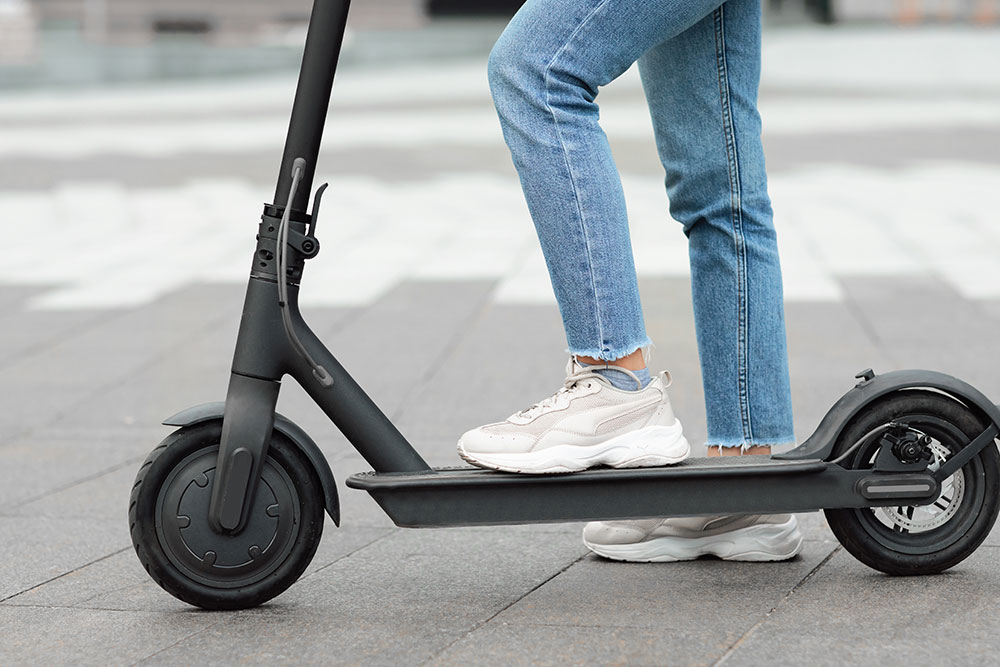E-scooter safety warning
They might be fun to ride and a great transport option, but e-scooters can be dangerous.

Every shift is busy for Dr Gary Mitchell at one of Brisbane’s biggest emergency departments.
Years ago, he could have never imagined he would be seeing so many patients as a result of electric scooter crashes.
E-scooter usage has taken off quicker than the scooters themselves and research shows a staggering number of riders are ending up in hospital with a vast range of injuries.
“Last week we had a patient come in with multiple rib fractures and organ injuries in their abdomen and we’ve had some cases where patients have died as well,” Dr Mitchell, Emergency Medicine Physician at Royal Brisbane and Women’s Hospital (RBWH), said.
“At RBWH we have an average of one and a half to two presentations per day, so anywhere from 40 to 60 presentations over a month.
“These people with significant injuries end up in a tertiary trauma centre, so it has a huge impact.”
A combined donation of $200,000 from RACQ and RBWH Foundation will fund research into e-scooter injuries, which will influence policies and laws for improving user safety.
The funding will support three research projects over a three-year collaboration between Jamieson Trauma Institute (JTI), a leader in injury research, and major emergency departments, including RBWH.
“If we could use this research to even halve the presentations to our emergency department that would be a huge benefit for our bed block at the moment,” Dr Mitchell said.
“We’ve already gathered data from over 950 e-scooter presentations, but this donation will allow us to continue this research and do more in-depth work with specialists within the hospital from the orthopaedics and neurosurgical teams.
“For example, we’ve already found about 30% of those presentations have alcohol on board but that’s really an underestimate as 63% of cases didn’t mention whether they’ve had alcohol or not, but we need people on the floor to collect that data.
“Even with that significant presentation of 30% with alcohol on board, we have found some significant findings.
“They are three times more likely to be admitted to short stay or hospital if they used alcohol compared to not using alcohol and they are more likely to have a more severe injury.”
RACQ research into e-scooter behaviour revealed an alarming number of riders were not taking safety seriously.
RACQ’s survey found almost half of e-scooter riders admitted to dangerous riding behaviour and more than 10% did not use safety equipment.
Many users also admitted to riding under the influence of alcohol, not knowing the road rules and crashing.
RACQ Road Safety and Technical Manager Joel Tucker said the survey also found a quarter of e-scooter owners modified them to go faster.
“We know that the majority of people who use e-scooters jump on them for a bit of fun, but they can be incredibly dangerous and with the uptake increasing across the state, it’s time people took safety into consideration,” Mr Tucker said.
“We were shocked to learn that 27% of e-scooter users surveyed admitted to riding under the influence of alcohol and only 29% of people knew exactly where it’s legal to ride an e-scooter.”
Related topics
Things to note
The information in this article has been prepared for general information purposes only and is not intended as legal advice or specific advice to any particular person. Any advice contained in the document is general advice, not intended as legal advice or professional advice and does not take into account any person’s particular circumstances. Before acting on anything based on this advice you should consider its appropriateness to you, having regard to your objectives and needs.
Insurance Products (excluding Travel Insurance) are issued by RACQ Insurance Limited ABN 50 009 704 152 (RACQI) and arranged by its agent, RACQ Distribution Services Pty Ltd (RDS) ABN 35 116 361 650, AFSL 567130 and RDS' authorised representatives (including RACQ Operations Pty Ltd ABN 80 009 663 414, AR No. 234978 (RACQO). Conditions, limits and exclusions apply. RDS and RACQO are in the RACQ group of companies. One of the companies in the RACQ group of companies has a minority shareholding in RACQI.
RDS and RACQO have not taken your personal objectives, circumstances or needs into account when preparing advice regarding insurance products and you will need to consider whether the advice is appropriate for you. Read the Product Disclosure Statement (PDS) and any applicable Supplementary PDS before making a purchase decision on this product. You can also access our Target Market Determinations on this website. RDS receives a commission from RACQI for the policies it arranges. RACQO receives fees paid for services it provides to RDS. Further details about remuneration are available on request prior to purchasing.
Banking and loan products issued by Members Banking Group Limited ABN 83 087 651 054 AFSL/Australian credit licence 241195 trading as RACQ Bank. Terms, conditions, fees, charges and lending policies apply. This is general advice only and may not be right for you. This information does not take your personal objectives, circumstances or needs into account. Read the disclosure documents for your selected product or service, including the Financial Services Guide and the Terms and Conditions, and consider if appropriate for you before deciding.
Except for RACQ Bank, any RACQ entity referred to on this page is not an authorised deposit-taking institution for the purposes of the Banking Act 1959 (Cth). That entity’s obligations do not represent deposits or other liabilities of RACQ Bank. RACQ Bank does not guarantee or otherwise provide assurance in respect of the obligations of that entity, unless noted otherwise.
RACQ Bank subscribes to the Customer Owned Banking Code of Practice which establishes higher standards than the law requires. The Code reflects modern consumer expectations and developments in approaches to issues such as consumer vulnerability, guarantors, and supporting customers through financial hardship. Please read our Customer Owned Banking Code of Practice page for more information.
RACQ Operations Pty Ltd (ABN 80 009 663 414 AR 000234978) and Members Travel Group Pty Ltd (ABN 45 144 538 803 AR 000432492) are acting as an Authorised Representative of the issuer of the insurance, Tokio Marine & Nichido Fire Insurance Co., Ltd. (ABN 80 000 438 291 AFSL 246 548). Any advice set out above is general in nature only, and does not take into account your objectives, financial situation or needs. Before purchasing any travel products, please consider the RACQ Travel Insurance Product Disclosure Statement (PDS) and the Target Market Determinations (TMDs) that apply to these products. Whilst the PDS outlines the Terms and Conditions of these products, the TMDs outline the intended class of customers that comprise the target market for these travel products. This will allow you to consider which products best suit your objectives, financial situation and needs and consider the products appropriateness to your personal circumstances. TMDs also outline matters involving the distribution and the review of these products. The PDS, Supplementary PDS and TMDs for each travel product can be found here.

